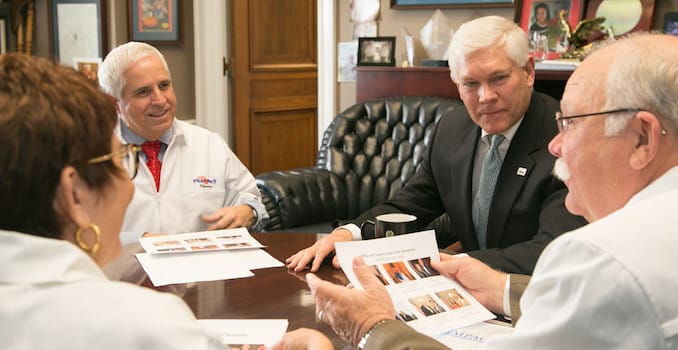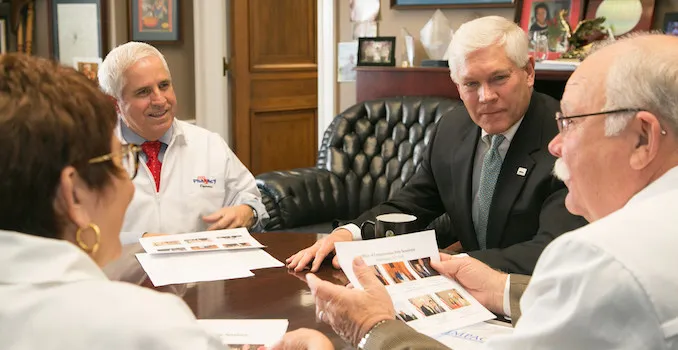
Team H-E-B meets with Sen. Pete Sessions (R., Texas) at the 2018 NACDS RxImpact Day on Capitol Hill.
An understanding of the value created by the National Association of Chain Drug Stores’ annual RxImpact Day — for the policy makers and pharmacy advocates who participated, the pharmacy profession as a whole and, ultimately, patients across the country — came into sharp focus during the daylong series of meetings on Capitol Hill that is the centerpiece of the event.
To watch the interaction between members of Congress and industry representatives is to observe the continuation of a vibrant dialogue, one stretching back to the first NACDS RxImpact Day a decade ago.
This year’s edition of the event, which took place early this month, brought together more than 450 retail executives, frontline practitioners and students to make the case for community pharmacy. For the first time, individuals from all 50 states participated, and the group made contact with 100% of House and Senate offices. Impressive as the numbers are, they only begin to explain why RxImpact Day is so important.
At the most basic level, the event helps educate new members of Congress about retail pharmacy and its place in the nation’s health care system. (Since last year’s RxImpact Day had to be canceled because of inclement weather, the event served that purpose for candidates elected for the first time in 2016.) With senators, representatives and their staff members besieged by constituents regularly weighing in on a broad range of complex issues, a primer on pharmacy from people directly involved lends a whole new perspective to the profession.

An executive taking part in RxImpact Day recalled having to correct a few years ago the misperception of a young congressional staffer that patients don’t really know their pharmacists. She did away with that notion by recalling examples of countless interactions with patients whom she knew on a first-name basis when she worked behind the prescription counter, and went on to explain how those relationships are particularly important to older people, who are usually dependent on prescription medications to maintain their well-being.
With returning members, the discussion goes deeper, building on a foundation of knowledge and understanding laid in previous years. The long duration of the legislative process in Washington, which is frequently measured not in weeks or months but in years, makes a clear, consistent policy message, reinforced over time, invaluable.
Tricare is a case in point. Funding and patient access are perennial flash points under the program for military personnel and their dependents. Working in small groups, RxImpact Day participants communicated proposals to level the playing field between community pharmacies and mail-order providers and military treatment facilities and, in the process, cut overall costs for the federal government.
Following succinct talking points prepared by the NACDS government affairs team (other issues that received the same treatment included provider status for pharmacists, direct and indirect remuneration, and the opioid crisis), the presentations, in close alignment with recommendations for Tricare made in previous years, pointed the way to improving the program to produce meaningful benefits for the people who depend on it.
The discussions really came to life when pharmacists that care for patients every day talked about how Tricare’s current structure results in hardships for beneficiaries. A young practitioner from a southern state told a local congressman how one Tricare recipient she knows is forced to make a long drive to a military treatment facility to obtain medications, depriving him of the chance to utilize the drug store in his small town. The story of his plight and its implications, including an unnecessary impediment to medication adherence, put a human face on a policy question. That dynamic, repeated hundreds of times during the course of RxImpact Day, made a lasting impression on policy makers.
In regard to Tricare, members of Congress were asked to support a letter requesting that the Defense Department establish a working group, including representatives of the Defense Health Agency, pharmaceutical makers and retail pharmacy operators, to explore new ways to maximize pharmacy choice for beneficiaries while at the same time reducing costs.
For their part, legislators exhibited a keen interest in how the issues raised by NACDS members are affecting their constituents and a willingness to try to make the health care system work better. The devil, of course, is in the details, and individual members were left to assess what they heard in light of their ideological leanings and judgment about how to prioritize the nation’s pressing problems. Whatever the outcome on specific issues, pharmacy advocates helped maintain lines of communication with senators and representatives that will serve the industry well for the duration of the 115th Congress and beyond.
That dialogue is not a once-a-year phenomenon. The NACDS RxImpact Day program includes a key contact initiative that formalizes relationships between pharmacy executives and members of Congress to promote the industry’s agenda, a bipartisan campaign designed to promote pro-pharmacy candidates, and a program that has arranged 650 store tours and other in-district events with senators and representatives over the past 10 years. The upshot of RxImpact Day and related activities is an informed Congress that is more likely than before to enact legislation favorable to community pharmacy and the patients it serves.







